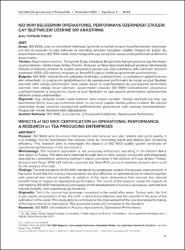ISO 9001 belgesinin operasyonel performans üzerindeki etkileri: Çay işletmeleri üzerine bir araştırma
Künye
Tuygun Toklu, A. (2021). ISO 9001 belgesinin operasyonel performans üzerindeki etkileri: Çay işletmeleri üzerine bir araştırma. Verimlilik Dergisi, 2, 49-63. http://doi.org/10.51551verimlilik.692939Özet
Amaç: ISO 9000, ürün ve hizmetlerin tehlikesiz, güvenilir ve kaliteli olmasını hedeflemektedir. İşletmeler
için atık ve kusurları en aza indirerek ve verimliliği artırarak maliyetleri azaltan stratejik bir araçtır. Bu
araştırmanın amacı, ISO 9001 kalite sistem belgesinin çay sanayinde operasyonel performansa etkilerini
araştırmaktır.
Yöntem: Araştırmanın evrenini, Türkiye’nin Doğu Karadeniz Bölgesi’nde faaliyet gösteren çay fabrikaları
oluşturmaktadır. Veriler Hopa, Arhavi, Fındıklı, Ardeşen ve Pazar ilçelerinde faaliyet gösteren fabrikalarda
kolayda örnekleme yöntemi ile seçilen çalışanlarla yapılan yüz yüze anketlerle elde edilmiştir. Verilerin
analizinde SPSS v23 istatistik programı ve SmartPLS yapısal eşitlik programından yararlanılmıştır.
Bulgular: ISO 9001 standartlarının çalışanlar tarafından içselleştirilmesi, iş süreçlerinin geliştirilmesine
etki etmektedir. İş süreçlerinin geliştirilmesinin de operasyonel performans ile dışsal ve içsel faydalar
üzerinde etkili olduğu bulunmuştur. İlave olarak dışsal ve içsel faydaların da operasyonel performans
üzerinde etkili olduğu tespit edilmiştir. Araştırmanın sonuçları ISO 9001 standartlarının çalışanlarca
içselleştirilmesinin iş süreçlerinin, dışsal ve içsel faydaların ve operasyonel performansın gelişmesinde
etkilerini ortaya çıkarmaktadır.
Özgünlük: Çay, dünyada sudan sonra tüketilen ikinci büyük içecektir. Türkiye dünyada kişi başı çay
tüketiminde birinci, kuru çay üretiminde altıncı ve çay tarımı yapılan alanda yedinci sıradadır. Bu çalışma
öneminden dolayı sektörün operasyonel performansının gelişmesine katkı sunmayı amaçlamaktadır.
Oluşturulan model literatüre katkı sağlayacaktır Purpose: ISO 9000 aims to ensure that products and services are safe, reliable and good quality. It
is a strategic tool for businesses that reduces costs by minimizing waste and failures and increasing
efficiency. This research aims to investigate the impacts of ISO 9001 quality system certificate on
operational performance in the tea industry.
Methodology: The research population is tea producing enterprises operating in the Eastern Black
Sea region in Turkey. The data were obtained through face-to-face surveys conducted with employees
selected by convenience sampling method in plants operating in the districts of Hopa, Arhavi, Fındıklı,
Ardeşen and Pazar. SPSS v23 statistics program and SmartPLS structural equation program were used
for the analysis of sil data.
Findings: The internalization of ISO 9001 standards by employees impacts the process improvements. It
has been found that the process improvements are also effective on operational performance together
with external and internal benefits. In addition, it has been determined that external and internal
benefits have an impact on operational performance. The results of the research reveal the impacts of
internalizing ISO 9001 standards by employees on the development of business processes, external and
internal benefits, and operational performance.
Originality: Tea is the second top beverage consumed in the world after water. Turkey ranks the first
in per capita consumption of tea, the sixth in dried tea production and the seventh in the area of tea
cultivation in the world. This study aims to contribute to the improvement of the operational performance
of the sector due to its importance. The proposed model will contribute to the literature.


















